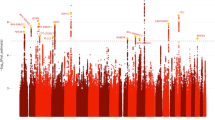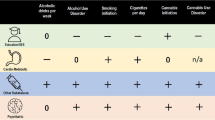Abstract
Genome-wide association studies (GWAS) currently represent the most systematic approach to genetic research into complex disorders. They can detect associations of common variants in genomic regions in the absence of an a priori assumption. Most of the GWAS of addiction performed to date have focused on alcohol dependence or smoking behavior. Four GWAS of alcohol dependence have been published thus far, and only two single nucleotide polymorphisms have received modest support of replication in a subsequent study. Many more GWAS have been conducted for smoking behavior. One large, single GWAS and meta-analyses of the phenotype “smoking quantity” have generated convincing evidence for the contribution of variants in genes for cholinergic nicotinic receptor subunits. This article focuses on GWAS of alcohol addiction and provides an overview of GWAS of other substance abuse disorders.
Similar content being viewed by others
References
Papers of particular interest, published recently, have been highlighted as: • Of importance •• Of major importance
Enoch MA.: Pharmacogenomics of alcohol response and addiction. Am J Pharmacogenomics. 2003;3:217–232.
Spanagel R: Alcoholism: a systems approach from molecular physiology to addictive behavior. Physiol Rev. 2009, 89:649–705.
Bevilacqua L, Goldman D. Genes and addictions. Clin Pharmacol Ther. 2009 Apr;85(4):359–61.
Merikangas KR, Stolar M, Stevens DE, et al. Familial transmission of substance use disorders. Arch Gen Psychiatry. 1998, 55:973–979.
Li MD, Burmeister M: New insights into the genetics of addiction. Nat Rev Genet. 2009, 10:225–231.
Risch N, Merikangas K: The future of genetic studies of complex human diseases. Science 1996, 273:1516–1517.
Hodgkinson CA, Yuan Q, Xu K, et al.: Addictions biology: haplotype-based analysis for 130 candidate genes on a single array. Alcohol Alcohol 2008, 43:505–515.
Prescott CA, Sullivan PF, Kuo PH, et al.: Genomewide linkage study in the Irish affected sib pair study of alcohol dependence: evidence for a susceptibility region for symptoms of alcohol dependence on chromosome 4. Mol Psychiatry. 2006, 11:603–611.
Edenberg HJ: The genetics of alcohol metabolism: role of alcohol dehydrogenase and aldehyde dehydrogenase variants. Alcohol Res Health 2007, 30:5–13.
Ball D: Addiction science and its genetics. Addiction. 2008, 103:360–367.
Harris RA, Trudell JR, Mihic SJ. Ethanol’s molecular targets. Sci Signal. 2008 Jul 15;1(28):re7.
Agrawal A, Edenberg HJ, Foroud T, et al.: Association of GABRA2 with drug dependence in the collaborative study of the genetics of alcoholism sample. Behav Genet. 2006, 36:640–650.
Saccone SF, Hinrichs AL, Saccone NL, et al.: Cholinergic nicotinic receptor genes implicated in a nicotine dependence association study targeting 348 candidate genes with 3713 SNPs. Hum Mol Genet 2007, 16:36–49.
International HapMap Consortium: The International HapMap Project. Nature. 2003, 426:789–796.
Dudbridge F, Gusnanto A: Estimation of significance thresholds for genomewide association scans. Genet. Epidemiol. 2008, 32:227–234.
Hoggart CJ, Clark TG, De Iorio M et al.: Genome-wide significance for dense SNP and resequencing data. Genet. Epidemiol. 2008, 32:179–185.
Pe’er I, Yelensky R, Altshuler D, et al. Estimation of the multiple testing burden for genome-wide association studies of nearly all common variants. Genet. Epidemiol. 2008, 32:381–385.
Hindorff LA, Sethupathy P, Junkins HA, et al.: Potential etiologic and functional implications of genome-wide association loci for human diseases and traits. Proc Natl Acad Sci U S A. 2009, 106:9362–9367.
•• Hindorff LA, Junkins HA, Hall PN, et al.: A Catalog of Published Genome-Wide Association Studies. Available at http://www.genome.gov/gwastudies. The comprehensive online catalog for SNP-trait associations from published GWAS at the National Institutes of Health is the central resource in which findings from GWAS are collected and reported.
Johnson C, Drgon T, Liu QR, Walther D, Edenberg H, Rice J, Foroud T, Uhl GR. Pooled association genome scanning for alcohol dependence using 104,268 SNPs: validation and use to identify alcoholism vulnerability loci in unrelated individuals from the collaborative study on the genetics of alcoholism. Am J Med Genet B Neuropsychiatr Genet. 2006 Dec 5;141B(8):844–53.
• Treutlein J*, Cichon S*, Ridinger M*, et al.: Genome-wide association study of alcohol dependence. *indicates co-primary authorship. Arch Gen Psychiatry. 2009, 66:773–784. This GWAS was conducted on a case sample of individuals of male gender and with an early age at onset. In a follow-up study, in addition to top-down hits, nominally significant SNPs from the initial scan were considered that were located in genes that had shown expression changes in rat brains after long-term alcohol consumption. Fifteen SNPs showed significant association with the same allele as in the initial scan, two of which had genome-wide significance in a combined analysis.
Nurnberger JI Jr, Foroud T, Flury L et al.: Evidence for a locus on chromosome 1 that influences vulnerability to alcoholism and affective disorder. Am J Psychiatry. 2001, 158:718–724.
Schuckit MA, Edenberg HJ, Kalmijn J, et al.: A genome-wide search for genes that relate to a low level of response to alcohol. Alcohol Clin Exp Res. 2001, 25:323–329.
Uhl GR, Drgon T, Liu QR, Johnson C et al.: Genome-wide association for methamphetamine dependence: convergent results from 2 samples. Arch Gen Psychiatry. 2008, 65:345–355.
• Lind PA, Macgregor S, Vink JM, et al.: A genomewide association study of nicotine and alcohol dependence in Australian and Dutch populations. Twin Res Hum Genet. 2010, 13:10–29. This GWAS analyzed alcohol dependence and nicotine dependence and comorbid alcohol/nicotine dependence in a sample from Australia (QIMR). A meta-analysis was conducted with a second GWAS sample from The Netherlands. Genes for ion channels and cell adhesion molecules were overrepresented, as revealed by a gene network diagram.
• Bierut LJ, Agrawal A, Bucholz KK, et al.: A genome-wide association study of alcohol dependence. Proc Natl Acad Sci U S A. 2010, 107:5082–5087. This GWAS analyzed the SAGE sample and found 15 SNPs that had P<10 −5 in the initial study, but none passed a replication P<0.05 in 2 independent replication series. Five SNPs at the GABRA2 locus yielded nominal (uncorrected) significance (P<0.05).
• Edenberg HJ, Koller DL, Xuei X, et al.: Genome-wide association study of alcohol dependence implicates a region on chromosome 11. Alcohol Clin Exp Res. 2010, 34:840–852. This study conducted a GWAS on a sample of cases and controls drawn from the families in COGA and a family-based replication study. Strongest support was received for a cluster of genes on chromosome 11.
• Thorgeirsson TE, Geller F, Sulem P, et al.: A variant associated with nicotine dependence, lung cancer and peripheral arterial disease. Nature. 2008, 452:638–642. This GWAS was the first to yield genome-wide significance on chromosome 15q for smoking quantity.
• Liu JZ, Tozzi F, Waterworth DM, et al.: Meta-analysis and imputation refines the association of 15q25 with smoking quantity. Nat Genet. 2010, 42:436–440. This GWAS is one of the three meta-analyses published in the May 2010 edition of Nature Genetics. The authors analyzed the number of cigarettes smoked per day and all found the strongest association in the 15q25 region. This region harbors genes for subunits of cholinergic nicotinic receptors.
• Tobacco and Genetics Consortium: Genome-wide meta-analyses identify multiple loci associated with smoking behavior. Nat Genet. 2010, 42:441–447. This GWAS is one of the three meta-analyses published in the May 2010 edition of Nature Genetics. The authors analyzed the number of cigarettes smoked per day and all found the strongest association in the 15q25 region. This region harbors genes for subunits of cholinergic nicotinic receptors.
• Thorgeirsson TE, Gudbjartsson DF, Surakka I, et al. Sequence variants at CHRNB3-CHRNA6 and CYP2A6 affect smoking behavior. Nat Genet. 2010, 42:448–453. This GWAS is one of the three meta-analyses published in the May 2010 edition of Nature Genetics. The authors analyzed the number of cigarettes smoked per day and all found the strongest association in the 15q25 region. This region harbors genes for subunits of cholinergic nicotinic receptors.
• Saccone NL, Culverhouse RC, Schwantes-An T-H, et al.: Multiple independent loci at chromosome 15q25.1 affect smoking quantity: a meta-analysis and comparison with lung cancer and COPD. PLoS Genet 2010, 6(8): e1001053. This study presented evidence that at least two distinct SNPs at 15q25 affect smoking behavior. The authors performed a meta-analysis of 34 datasets containing individuals of European ancestry and confirmed the previous findings at the 15q25 region with genome-wide significance. In their dataset, they additionally analyzed the phenotypes lung cancer and chronic obstructive pulmonary disease.
Mansvelder HD, McGehee DS: Cellular and synaptic mechanisms of nicotine addiction. J Neurobiol. 2002, 53:606–617.
Bierut LJ, Stitzel JA, Wang JC, et al.: Variants in nicotinic receptors and risk for nicotine dependence. Am J Psychiatry 2008, 165:1163–1171.
Wang JC, Cruchaga C, Saccone NL, et al.: Risk for nicotine dependence and lung cancer is conferred by mRNA expression levels and amino acid change in CHRNA5. Hum Mol Genet. 2009, 18:3125–3135.
Nielsen DA, Ji F, Yuferov V, Ho A, et al.: Genome-wide association study identifies genes that may contribute to risk for developing heroin addiction. Psychiatr Genet. 2010, Jun 1. (Epub ahead of print).
Ujike H, Sato M: Clinical features of sensitization to methamphetamine observed in patients with methamphetamine dependence and psychosis. Ann N Y Acad Sci. 2004, 1025:279–287.
Liu QR, Drgon T, Johnson C, et al.: Addiction molecular genetics: 639,401 SNP whole genome association identifies many “cell adhesion” genes. Am J Med Genet B Neuropsychiatr Genet. 2006, 141B:918–25.
Johnson C, Drgon T, Liu QR, et al.: Genome wide association for substance dependence: convergent results from epidemiologic and research volunteer samples. BMC Med Genet. 2008, 9:113.
Drgon T, Zhang PW, Johnson C, et al. Genome wide association for addiction: replicated results and comparisons of two analytic approaches. PLoS One. 2010, 5(1):e8832.
Kurian SM, Le-Niculescu H, Patel SD et al.: Identification of blood biomarkers for psychosis using convergent functional genomics. Mol Psychiatry. 2009, Nov 24 (Epub ahead of print).
Kiefer F*, Witt SH*, Frank J, et al.: Involvement of the atrial natriuretic peptide transcription factor GATA4 in alcohol dependence, relapse risk and treatment response to acamprosate. *equally contributed Pharmacogenomics J. 2010, Jun 29. (Epub ahead of print).
Acknowledgments
Funding support for this work was provided through grants from the German Federal Ministry of Education and Research (NGFN-Plus) and by the Collaborative Research Center SFB 636.
Disclosure
No potential conflicts of interest relevant to this article were reported.
Author information
Authors and Affiliations
Corresponding author
Rights and permissions
About this article
Cite this article
Treutlein, J., Rietschel, M. Genome-Wide Association Studies of Alcohol Dependence and Substance Use Disorders. Curr Psychiatry Rep 13, 147–155 (2011). https://doi.org/10.1007/s11920-011-0176-4
Published:
Issue Date:
DOI: https://doi.org/10.1007/s11920-011-0176-4




